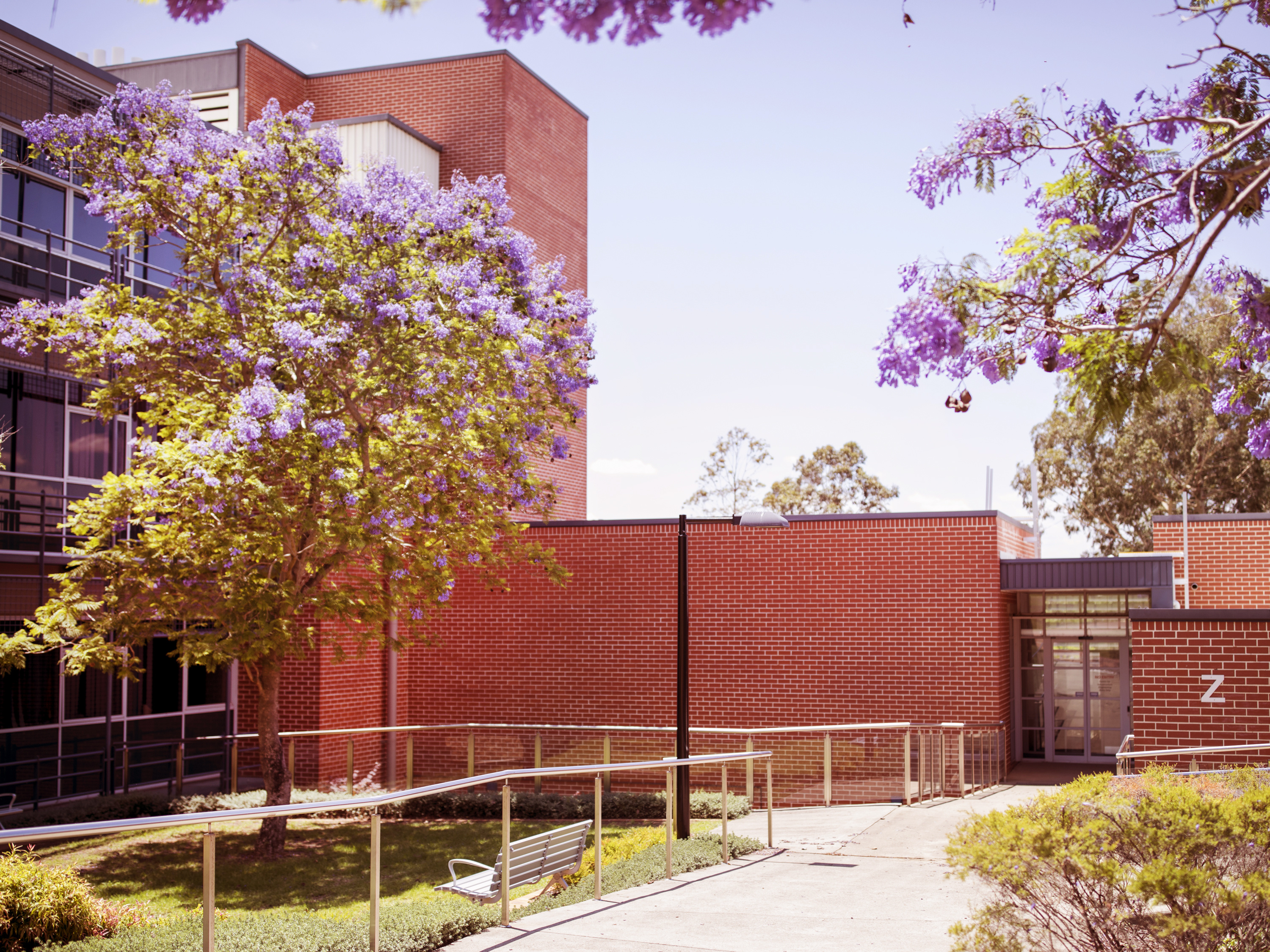Good at solving problems? Our Occupational Therapy graduates are called upon to find solutions in movement difficulties and environmental barriers for those with mobility problems, to ensure broad participation in work, play, and life.
Advance human health
REGISTER NOW FOR OPEN DAY 2024
Open Day is a great opportunity to discover all that Western has to offer.
Explore course options, meet academics and find out about our pathway options on Sunday, 30 June 2024.
Register now to join us. We can't wait to see you at Open Day 2024!

The program is accredited by the Occupational Therapy Council of Australia (Ltd) and approved by the Occupational Therapy Board of Australia. Graduates will be eligible to apply for registration as an occupational therapist with the Occupational Therapy Board of Australia (OTBA). The program is also approved by the World Federation of Occupational Therapists.
This degree gives you at least 1,000 hours’ professional practice in a range of settings.
If you decide to leave at the end of your third year, you won’t be qualified to work as an OT but you will be eligible for a Bachelor of Health Science.
What you can expect to study
The program structure is outlined in our handbook. Here you can view all of the subjects you will be studying.
Career Opportunities
As a graduate of this degree, you can look forward to a broad range of exciting career opportunities in different sectors and industries. Below are some examples of the possible careers you can pursue with this degree:
- Community health
- Emergency or trauma units
- Forensics
- Drug and alcohol health
- Occupational health
- Palliative care
- Oncology
Entry requirements for domestic students
Applicants who have undertaken studies overseas may have to provide proof of proficiency in English. Local and International applicants who are applying through the Universities Admissions Centre (UAC) will find details of minimum English proficiency requirements and acceptable proof on the UAC website. Local applicants applying directly to the University should also use the information provided on the UAC website. Find out more here.
Admission
- Assumed knowledge: any 2 units of English.
- Recommended studies: Physics, Chemistry, Biology and/or Personal Development Health and Physical Education.
To be eligible to undertake fieldwork or practice placements, students must also comply with the NSW Health Records and Information Privacy Act (2004) and complete a relevant declaration.
Special Requirements
Students must meet Western Sydney University course requirements as well as any special, legislated, or policy-mandated requirements.
Visit the Special Requirements webpage for more details.
To be able to undertake placement in any NSW Health facility you must be assessed as compliant with NSW Health student placement policy in the first year of your program, regardless of when you expect to go on your first placement. Access and read the NSW Student Compliance Information Booklet.
Please ensure that you
- Find your existing National Police Check or apply for one
- Gather documentary evidence of your vaccination history
- Print and compete all relevant NSW Health forms relevant to the campus you are enrolled at or online enrolment requirements
- Follow booklet instructions on how to have your compliance documents assessed by NSW health staff.
Contact your School for further details regarding your School’s requirements, if any, such as
- If you live outside of NSW or Australia and need to meet your state, territory or country’s compliance requirements
- If you need to meet different state, territory or country compliance requirements.
- NSW Working with Children Check (WWCC) or other state equivalent, valid for your entire program.
- Current approved first aid certificate valid for your entire program - approved program providers can be found at the Government Training website
- Other non-health related requirements
Student Compliance Resources are also available on the Placements Hub web page (NSW students only).
Please consult the handbook for more information.
Entry requirements for international students
Applicants who have undertaken studies overseas may have to provide proof of proficiency in English. Local applicants who are applying through the Universities Admissions Centre (UAC) will find details of minimum English proficiency requirements and acceptable proof on the UAC website. Local applicants applying directly to the University should also use the information provided on the UAC website.
International students currently completing an Australian Year 12 in or outside Australia, an International Baccalaureate in Australia or a New Zealand National Certificate of Educational Achievement (NCEA) level 3 must apply via UAC International.
All other International applicants must apply directly to the University via the International Office.
International students applying to the University through the International Office can find details of minimum English proficiency requirements and acceptable proof on their website.
Overseas qualifications must be deemed by the Australian Education International - National Office of Overseas Skills Recognition (AEI-NOOSR) to be equivalent to Australian qualifications in order to be considered by UAC and Western Sydney University.
Admission
- Assumed knowledge: any 2 units of English.
- Recommended studies: Physics, Chemistry, Biology and/or Personal Development Health and Physical Education.
To be eligible to undertake fieldwork or practice placements, students must also comply with the NSW Health Records and Information Privacy Act (2004) and complete a relevant declaration.
Special Requirements
Students must meet Western Sydney University course requirements as well as any special, legislated, or policy-mandated requirements.
Visit the Special Requirements webpage for more details.
To be able to undertake placement in any NSW Health facility you must be assessed as compliant with NSW Health student placement policy in the first year of your program, regardless of when you expect to go on your first placement. Access and read the NSW Student Compliance Information Booklet.
Please ensure that you
- Find your existing National Police Check or apply for one
- Gather documentary evidence of your vaccination history
- Print and compete all relevant NSW Health forms relevant to the campus you are enrolled at or online enrolment requirements
- Follow booklet instructions on how to have your compliance documents assessed by NSW health staff.
Contact your School for further details regarding your School’s requirements, if any, such as
- If you live outside of NSW or Australia and need to meet your state, territory or country’s compliance requirements
- If you need to meet different state, territory or country compliance requirements.
- NSW Working with Children Check (WWCC) or other state equivalent, valid for your entire program.
- Current approved first aid certificate valid for your entire program - approved program providers can be found at the Government Training website
- Other non-health related requirements
Student Compliance Resources are also available on the Placements Hub web page (NSW students only).
Please consult the handbook for more information.
Indicative annual fee
A Commonwealth Supported Place (CSP) is one that is subsidised by the Commonwealth and applicable only to Domestic students. This means that the Australian Government pays part of your fees towards your program, therefore reducing your program fees, and the remaining amount is paid by you, this is considered your Student Contribution.
To work out how much your Student Contribution will be before you study, you will first need to find out the Student Contribution band your subjects fit into based on their general discipline area.
You can then calculate your student contributions to work out the total amount of your contribution.
The Higher Education Loan Program (HELP) is a range of loans introduced by the Australian Government from 2005 to provide fee payment assistance to eligible students. Loans are for Australian citizens studying in Australia or overseas. Permanent residents who hold a humanitarian visa are also eligible if studying in Australia.
If eligible you may be able to defer all or part of your Student Contribution through the HECS-HELP loan program. You may also be eligible for OS-HELP if undertaking studies overseas.
New Zealand citizens and holders of an Australian permanent resident visa (other than an Australian permanent humanitarian visa) are generally not entitled to HECS-HELP assistance. If you are a New Zealand citizen or permanent resident your Student Contribution amount must be paid in full by the census date.
However, the Australian Government has passed new legislation that changes the way some New Zealand citizens, who hold a Special Category Visa (SCV), studying in Australia will pay their fees. More information is available on the Changes to fees for New Zealand Citizens webpage.
Apply as a Domestic Student
If you are a domestic student, you can apply through our Western Application system which is free of charge.
Domestic students are:
- Australian Citizens
- New Zealand Citizens
- Australian permanent residents
- Australian permanent humanitarian visa holders
Scholarships
Western Sydney University recognises and rewards students who demonstrate community engagement, outstanding academic ability and superior leadership skills. Donor-funded scholarships are also available, providing support for students based on both academic achievements and equity considerations. There are also scholarships available for specific degrees.
Apply as an International Student
If you are an international student, you can apply for free through our international student application system or through an agent representative.
International students are:
- Not an Australian citizen;
- Not a New Zealand citizen; and
- Not a permanent resident of Australia.
If you are an international student completing the Australian HSC, IB or NCEA, apply direct via UAC International.
Admission to Western Sydney University is on the basis of meeting minimum academic and English language requirements. For more information about tuition fees and other costs, visit the Fees and Costs page.
Scholarships
When you apply to Western, you’re automatically assessed for a Scholarship, no additional application required! We’re offering multi-year scholarships (for up to 3 years) valued at $6,000 or $3,000 and even 50% off tuition fees. Scholarships are awarded on academic merit.
FAQs
We've gathered common questions to provide you with quick, clear answers about this program. Whether you're exploring admission requirements, details about the degree or career prospects, you'll find valuable insights here. If you need more information, our support team is ready to assist you on your journey to Western. You can find their details below.
You can study the Bachelor of Health Science (Clinical Science) and apply for the Bachelor of Occupational Therapy using your GPA.
Want to know more?
We're here to provide clarity.
If you're uncertain about your study journey, enquire about our program today and gain the confidence to move forward.
Australian students
1300 668 370
International students
+61 2 9852 5499

The tuition fees quoted above are the fees for the normal full-time study load of the program (80 credit points) per annum. International students will be subject to a variable fee regime; i.e. enrolled students will be required to pay fees during their program based on the approved fee for each calendar year. Fee changes (if any) will occur at 1 January each calendar year. Students who extend their program past the normal finish date of the program will be required to pay additional fees based on the prevailing fee level. Western Sydney University is a multi-campus institution. The University reserves the right to alter the location of its programs between campuses and other locations as necessary. Students should be aware of the possibility of change of location for the whole or part of programs for which they enrol and should plan for the need to travel between Western Sydney campuses.




